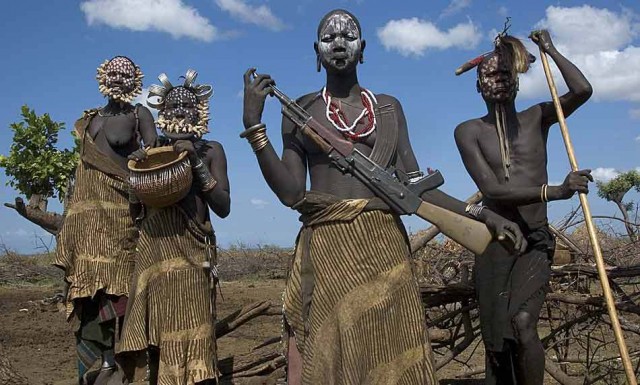Tribalism
Tribalism is identification with a particular ethnic group or “tribe.” In discussions of African politics and culture, tribalism usually appears as the opposite of NATIONALISM, devotion to the interests and culture of one's entire country. African leaders seeking to build new nations sometimes regard tribalism as primitive, an obstacle to developing a modern national identity. Another view of tribalism, however, is that it shows pride in one's cultural and historical roots and builds unity among people who share a common heritage.
Defining Tribalism
Africans themselves and people outside Africa generally agree that the basic social and cultural units of the continent are tribes (often called ethnic groups, peoples, societies, or communities). Nations are made up of combinations of these groups. A major difficulty in discussing tribalism, however, is deciding how to identify a “tribe.” Foreigners and Africans have used different approaches.
European missionaries and scholars were the first to classify Africans into tribes. In various situations they used language, location, or political organization as the basis for classification. Africans who shared a language were considered to be part of the same group. However, because most African languages include many dialects, identifying people by language could be complicated. Some Europeans used location as the method of classification, regarding a group occupying a single area of land as a tribe. Unfortunately, for the most part the territorial boundaries of groups were not precisely marked or matched to those of language use. As to political organization, some Europeans thought that a single political unit could be considered a tribe. The problem with this view was that an African king might rule over many different linguistic or geographic “tribes,” perhaps brought under his rule by conquest.

Africans use other methods of classifying themselves, related to systems of exchange—including trade and marriage—and shared beliefs and traditions. People who share a group identity handle trade issues, such as prices and credit, one way among themselves and another way with outsiders. When it comes to marriage, people have almost always preferred to find a spouse within their own group. Therefore, a group in which intermarriage occurs can be regarded as a tribe. Africans also recognize identity groups based on a shared cosmology, or view of the universe.
A common set of religious beliefs and ceremonies and a sense of obligation to help members of the community may define a tribe as well.
Colonialism and “Tribes.”
When Europeans began to colonize Africa they soon discovered that the local social and political systems were very different from those of the nations of Europe. One of the Europeans' first steps was to map their African territories, drawing boundaries around groups that they regarded as distinct tribes and defining them as political units.
Some of the groups identified by the Europeans had chiefs, recognized leaders with whom the colonial rulers could deal in matters of administration and taxation. If a group did not have a political leader, the colonial authorities appointed a chief. Some communities refused to accept these “invented chiefs,” leading to prolonged conflict with the authorities. In many cases, however, multiple small groups were placed under the rule of one appointed chief. These larger groups came to be treated as a single people, an “invented tribe.” Just as the borders of many modern African nations reflect territorial lines drawn by European powers, some of the tribal groupings now found in Africa were created by colonial administrators.
The Europeans built new towns and cities in the colonies, and Africans came to these urban centers to work. In the cities tribal identity became less important than social or economic class. However, when urban workers returned to their rural homes when they were old or sick, they generally returned to their ethnic or tribal identities as well, a pattern that continues today.
Tribalism Today
In modern Africa tribalism can mean several things. It may refer to the desire to preserve traditions, such as group names, values, and customs. Sometimes, however, the word tribalism is raised as an accusation. African nationalists—and those outside Africa who support them—may view those who disagree with them as “tribalists.” For example, rural Africans who do not share the ambitions of the governing class or who disapprove of government programs may be dismissed as “tribalists” without a sense of civic responsibility toward the nation. Ethnic identity is a central issue in Africa, where on more than one occasion ethnic rivalries have led to civil war. Yet in searching for a solution, some observers have suggested that tribalism and nationalism need not be regarded as opposites. Instead, both approaches perform the same function—-establishing a group's identity-—in different ways, and can contribute to strengthening African societies. (See also Boundaries in Africa, Colonialism in Africa, Ethnic Groups and Identity.)